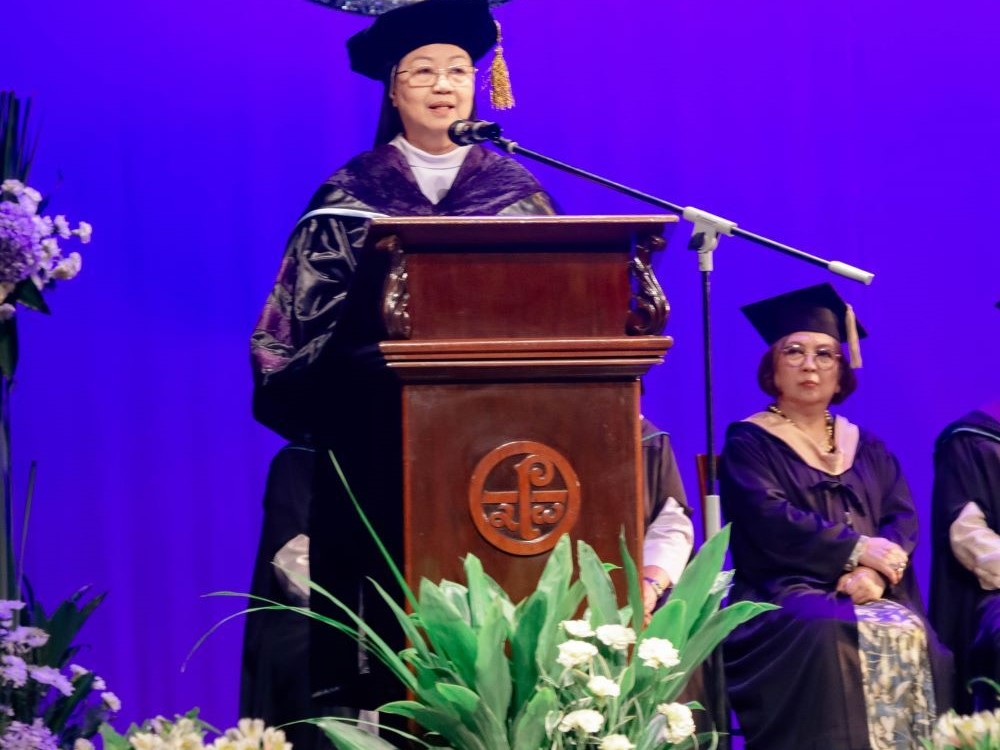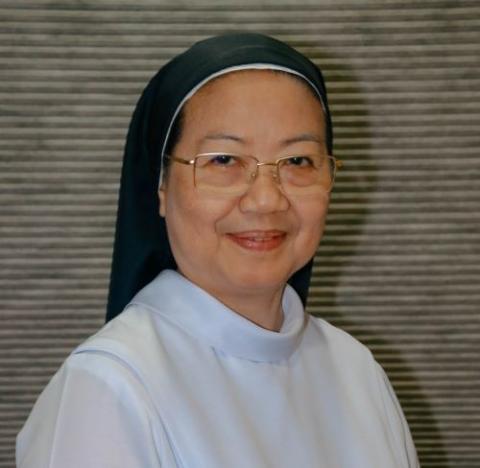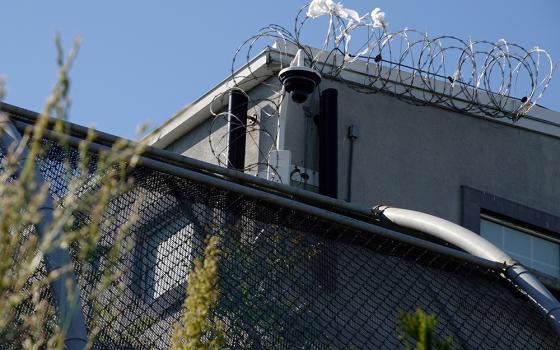
Sr. Rosario Obiniana speaks during her investiture as the 21st president of St. Scholastica's College, Manila, Philippines, on Sept. 12, 2024. Before assuming the presidency she headed St. Scholastica's College in Tacloban, a city in Central Philippines. (Courtesy of St. Scholastica's College Manila)
Sr. Rosario Obiniana was working as an elementary school teacher at St. Scholastica's College Manila in the 1970s when she experienced an internal struggle, sensing that "something was lacking and I could not explain nor find a word to identify my feeling."
A sister in her department, in whom she confided her "feeling of emptiness," advised Obiniana to listen to what the Lord was telling her and to pray.
She entered the Missionary Benedictine Sisters of Tutzing in 1981 and became the 21st president of St. Scholastica's College Manila in the Philippines in 2024. The Benedictine institution dates to 1906, when five Missionary Benedictine Sisters from Tutzing, Germany, opened a school in one of the capital's poorest districts.
The school, fondly referred to by Filipinos as "St. Scho," is renowned for educating young Filipino women. Among its notable alumni are the first female Philippine president, the late Corazon Aquino; the first Nobel Prize winner from the Philippines, journalist Maria Ressa; and the first woman Supreme Court justice of the country, the lateCecilia Muñoz-Palma.
An event organized by the school about the Nuclear Free Philippines Coalition turned Risa Hontiveros into a social justice advocate. Hontiveros is now an opposition senator in the administration of Ferdinand Marcos Jr., son of the country's lone dictator.
In an interview with Global Sisters Report, Obiniana spoke about the importance of educating women and the history of St. Scholastica's College Manila.
GSR: What's the most inspiring part of your day as an education and religious leader?
Obiniana: The most inspiring part of my day is encountering our students — their energy, their curiosity and their growing sense of purpose. Seeing our learners engage, discover and develop their potential in a supportive environment affirms the heart of our mission.

Sr. Rosario Obiniana first worked at St. Scholastica's College Manila in the 1970s as an elementary teacher before joining the Missionary Benedictine Sisters of Tutzing in 1981. (Courtesy of St. Scholastica's College Manila)
Whether in the classroom, in casual conversations on campus, or during moments of prayer, I witness how they are becoming thoughtful, compassionate and socially engaged individuals.
The integration of reflection, prayer and communal discernment into their daily life fosters not only personal growth but also a strong sense of shared mission and spiritual connection. This gives me hope — not just for the future of our school, but for the future of our nation.
How big is St. Scholastica's College in terms of student size and program offerings?
St. Scholastica's College serves a student population of over 2,000, comprising students from the preschool, grade school, high school, college, graduate school and the Night Secondary School, where we offer free education to less fortunate but capable students.
We offer a wide range of academic programs housed under the School of Music, School of Business and Accountancy, School of Arts and Sciences, and School of Hotel, Leisure, and Restaurant Management.
As a Catholic Benedictine institution, we place equal emphasis on intellectual formation and moral development, preparing students to serve with competence and conscience.
How influential has the institution been in Philippine society?
St. Scholastica's College has shaped generations of leaders — women who are principled, courageous and community-oriented. Our alumni have made significant contributions in education, government, business, the arts and social advocacy. For generations, we have been steadfast in promoting justice, peace, integrity of creation and the empowerment of women. These values have become part of our legacy in Philippine society.
Western universities, particularly in the U.S., are faced with the challenge of handling student populations with dissenting views on political and social realities. It has also been at the receiving end of budget cuts from the public sector. How do you nurture a healthy exchange of opposing viewpoints in the college amongst the students and faculty? And how is St. Scholastica able to sustain itself?
At St. Scholastica's College, we intentionally create a respectful and safe environment where open inquiry is affirmed and differing perspectives are welcomed. We encourage active listening, empathy and thoughtful engagement, recognizing that opposing viewpoints are not threats, but opportunities for deeper learning and mutual growth.
We work to sustain healthy dialogue not only in the classroom but also within the wider campus community — through forums, prayer moments, group discernment and shared reflection. We also encourage moments of pause when needed, giving space for reflection and deeper understanding.
As a private and mission-driven institution, we rely on tuition, generous donations and strategic partnerships. At the same time, we remain committed to prudent stewardship of our resources and continue to explore innovative and value-aligned strategies to sustain both academic excellence and our social mission. Our ability to adapt while staying rooted in our core values allows us to remain resilient in a constantly changing landscape.
Advertisement
What is your primary metric for success as leader of a historic institution like St. Scholastica?
Success, for me, is measured by how faithfully we live out the mission entrusted to us by our Catholic Benedictine heritage. Are we forming individuals of faith, integrity and service? Are we preparing students to become competent, compassionate and socially responsible leaders?
This mission is carried out collectively. Our faculty, staff and administrators are mission partners, journeying together as "One SSC [St. Scholastica's College]." We foster a culture of collaboration, innovation, professional growth and shared governance, where everyone contributes to the life and direction of the institution.We are deeply committed to cultivating a community rooted in Benedictine values — hospitality, respect, stewardship and a love of learning. These principles shape our school culture and create a learning environment where academic excellence and moral formation go hand in hand.
We aim to prepare students for meaningful work and responsible leadership, guided by our commitment to diversity, inclusion and transformation. When our graduates leave St. Scholastica not only well-educated but also with a strong moral compass and a genuine desire to serve, we know we have fulfilled our purpose.
The United Nations talks about the gender dividend from educating young women. How does this apply in the Philippine context?
In the Philippines, where women have long played vital and transformative roles in both family and society, educating young women contributes significantly to the nation's moral, social and economic development. At St. Scholastica's College, we have seen firsthand how empowering a Scholastican means empowering a leader, a changemaker and a servant to others. Our alumni continue to lead in fields such as education, public service, entrepreneurship and advocacy, demonstrating the far-reaching impact of women's education.
While our mission has always prioritized the formation of young women, we also welcome boys into our academic community, especially in our co-educational basic education levels and programs in college. We believe that the values of justice, peace, integrity of creation and service to others are universal, and every student — regardless of gender — deserves the opportunity to be formed in these values.
The gender dividend is not just a concept for us — it is a visible reality in how our graduates, both women and men, go on to break cycles of poverty, challenge inequality and build a more compassionate and just society.





